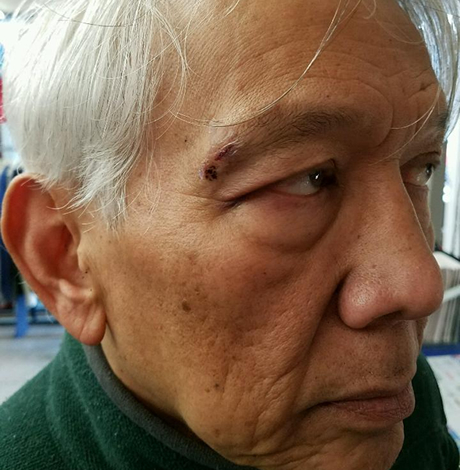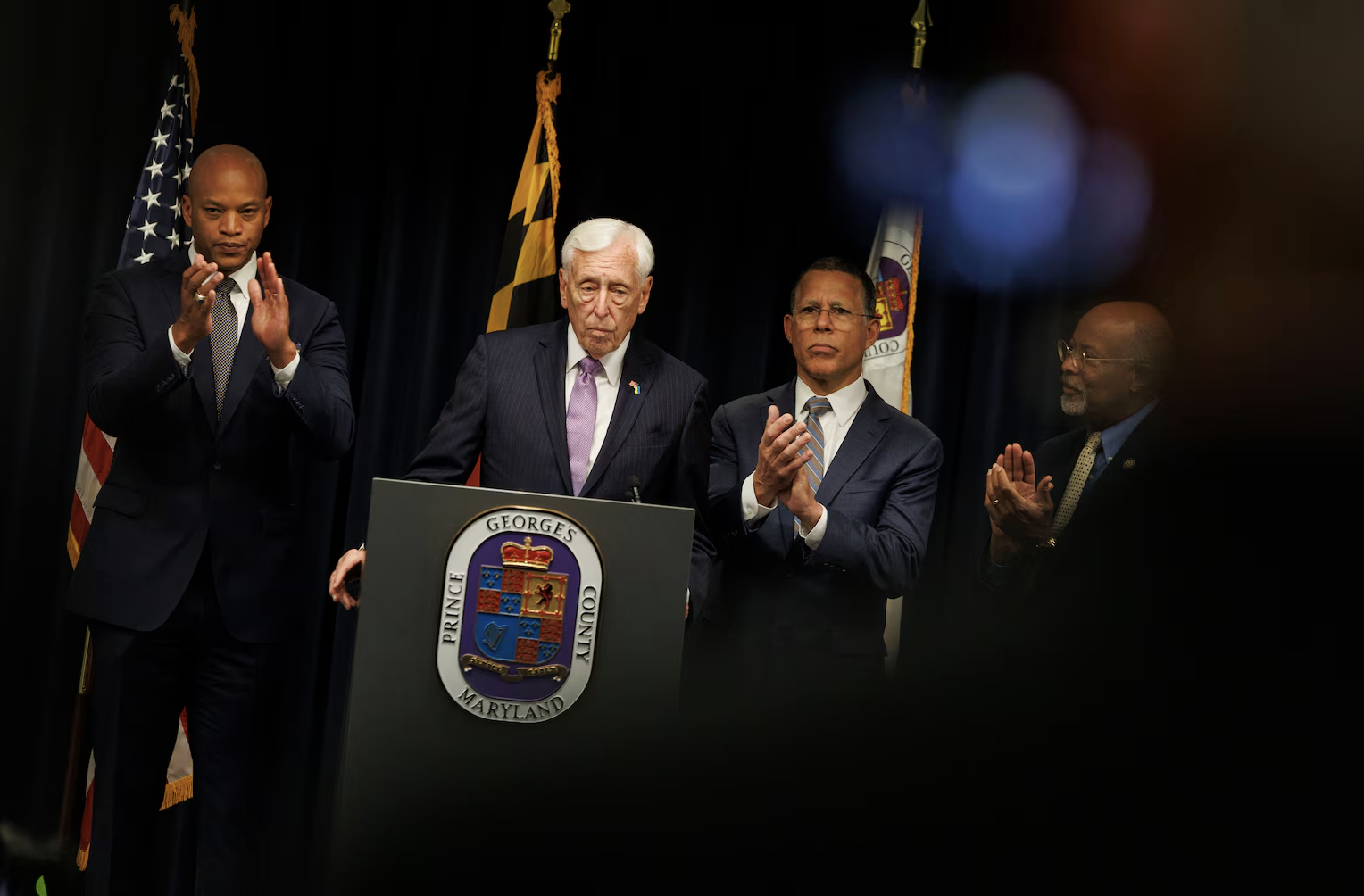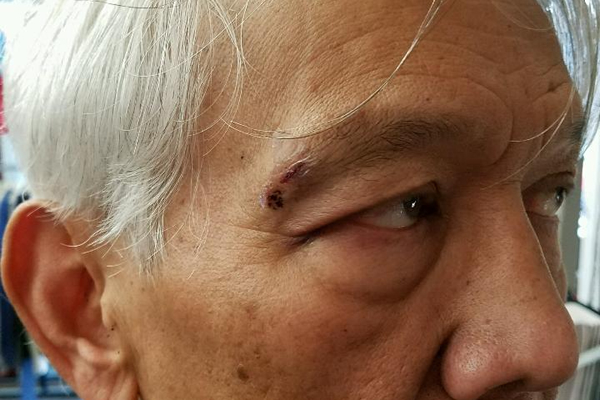Local
Del. gay man who alleged police abuse found guilty
Anti-gay bias allegation not mentioned in trial

GEORGETOWN, Del. — A 66-year-old gay man who filed a complaint against a police officer in Lewes, Del., for allegedly using excessive force to arrest him in January during an altercation at a hospital emergency room was found guilty by a Delaware judge on Tuesday on misdemeanor charges of disorderly conduct, menacing, and resisting arrest.
Judge Rosemary Beauregard of the Sussex County Court of Common Pleas announced at the conclusion of a non-jury trial in Georgetown, Del., that a state prosecutor proved beyond a reasonable doubt that Robaire G. Lizama engaged in “hysterical and abusive” behavior at the hospital that justified his arrest and confirmed he committed the three offenses.
In a development that court observers said was routine for a misdemeanor case like this one, Beauregard handed down an immediate sentence for Lizama that included a 30-day suspended jail term, six months of court-monitored probation, and a $600 fine plus $57 in court reimbursement costs.
In another development likely to surprise LGBT activists familiar with the case, Lizama’s public defender attorney Heather Lingo made no mention during the trial of Lizama’s written complaint to the Lewes Police Department in February alleging that the arresting officer singled him out because he’s gay.
When approached by the Blade after the trial Lingo declined to comment, saying she would have nothing more to say about the case.
“I don’t think he would grab a straight man, bear hug him and then body slam him to the ground and try to tell him he’s being arrested,” Lizama told the Washington Blade at the time he filed his complaint with Lewes Police Chief Thomas Sell in February.
Lizama, a former D.C. resident who lives in Lewes, has accused Officer Tyrone Woodyard of fabricating the charges against him after throwing him to the floor, causing a head injury during a Jan. 25 incident at Beebe Healthcare, a hospital in Lewes.
The arrest report prepared by Woodyard says Lizama had been acting in a disorderly manner after he accompanied a female friend to the emergency room who had been experiencing chest pain. Lizama testified at the trial that he was concerned that nurses who admitted and began to treat his friend weren’t being compassionate in their handling of the situation.
He denied he acted in a threatening or menacing way or that he refused to leave the emergency room when asked to do so by one of the nurses.
Jaqueline Marshall, the emergency room nurse who participated in the treatment of Lizama’s friend, and hospital security officer Julian Peacock testified that Lizama – while understandably upset that his friend may have been suffering from a heart attack – behaved in such an aggressive and hysterical way that the nursing staff became alarmed and felt threatened.
Marshall, Peacock and Officer Woodyard each testified that Lizama “lunged” at Woodyard while Woodyard and Peacock were escorting Lizama out of the emergency room area to the hospital’s lobby, where they told him he would have to wait while his friend was treated.
Woodyard told the court he couldn’t immediately determine whether Lizama was armed when Lizama suddenly turned toward him in an aggressive way. He said he decided to “taken him down” on the floor out of concern that Lizama could have harmed the nurses and others walking through the emergency room area.
Woodyard and Peacock testified that when Woodyard tried to handcuff Lizama after telling him he was under arrest, Lizama resisted the officer’s attempts to place cuffs on one of his hands and struggled with the officer and Peacock on the floor. This prompted another nurse to enter the fray and assist in restraining Lizama, the two testified.
Lizama testified that he turned toward Woodyard because he was trying to find his way to the entrance to the hospital lobby and in no way was attempting to attack or harm Woodyard. He said he didn’t resist the officer’s attempt to handcuff him but was moving about because he was in pain and was trying to place his hand over his forehead above his eye, which was bleeding after his head struck the floor when Woodyard knocked him down.
In response to questioning by Lingo, Marshall and Peacock acknowledged that Lizama was admitted to the emergency department for treatment after his arrest. Lingo presented a photo of Lizama as evidence that showed a gash over his eye and pointed to Lizama’s testimony that the injury required a plastic bandage to stop the bleeding,
Assistant State Attorney General Paul Seward, the lead prosecutor in the case, presented as evidence a video recording taken from the hospital’s security cameras that shows Lizama and his friend enter the hospital’s emergency department. The video footage shows Lizama moving about and raising his arms in what appeared to be an agitated state as he talked to one of the nurses at the admissions desk.
Beauregard said she based her verdict on what she called “credible and consistent” testimony by Marshall, Peacock and Woodward. She said the three witnesses along with the video recording at the trial convinced her that Lizama’s behavior was, in fact, posing a potential danger to the hospital staff and other visitors and proved he committed the misdemeanor offenses of disorderly conduct, menacing and resisting arrest.
The judge called Lizama’s testimony at the trial “inconsistent” and “contradictory.”
“All three of those witnesses thought something bad was going to happen,” she said. “He put the public at risk and he put his friend at risk,” said Beauregard, saying the disturbance Lizama was creating could have interfered with the nurses’ and doctors’ effort to diagnose and treat the friend.
It was later determined that the friend did not have a heart attack.
Lizama told the Blade after the trial that he had told Lingo, his attorney, about his belief that Officer Woodyard targeted him because he’s gay. He said he doesn’t know why Lingo didn’t raise that concern during the trial.
He has acknowledged that he doesn’t recall Woodyard making anti-gay remarks or making a reference to his sexual orientation at the time of the arrest but said he nevertheless got the impression that the officer assumed he’s gay.
When approached after the trial and asked by the Blade about Lizama’s allegation of anti-gay bias, Officer Woodyard refused to comment, saying he wasn’t authorized to speak to the media.
“I’m totally shocked,” Lizama said of the judge’s guilty verdict in an interview after the trial.
He said Lingo suggested he accept a plea bargain offer that Seward made minutes before the start of the trial. Still reeling over the verdict, Lizama said he didn’t remember what the terms of the plea offer consisted of.
“I told my attorney if I don’t think I’m guilty why would I plead guilty?” said Lizama. “I wholeheartedly didn’t think I was guilty so I said no. I wanted to go with the trial.”
Virginia
Gay Va. State Sen. Ebbin resigns for role in Spanberger administration
Veteran lawmaker will step down in February

Alexandria Democrat Adam Ebbin, who has served as an openly gay member of the Virginia Legislature since 2004, announced on Jan. 7 that he is resigning from his seat in the State Senate to take a job in the administration of Gov.-Elect Abigail Spanberger.
Since 2012, Ebbin has been a member of the Virginia Senate for the 39th District representing parts of Alexandria, Arlington, and Fairfax counties. He served in the Virginia House of Delegates representing Alexandria from 2004 to 2012, becoming the state’s first out gay lawmaker.
His announcement says he submitted his resignation from his Senate position effective Feb. 18 to join the Spanberger administration as a senior adviser at the Virginia Cannabis Control Authority.
“I’m grateful to have the benefit of Senator Ebbin’s policy expertise continuing to serve the people of Virginia, and I look forward to working with him to prioritize public safety and public health,” Spanberger said in Ebbin’s announcement statement.
She was referring to the lead role Ebbin has played in the Virginia Legislature’s approval in 2020 of legislation decriminalizing marijuana and the subsequent approval in 2021of a bill legalizing recreational use and possession of marijuana for adults 21 years of age and older. But the Virginia Legislature has yet to pass legislation facilitating the retail sale of marijuana for recreational use and limits sales to purchases at licensed medical marijuana dispensaries.
“I share Governor-elect Spanberger’s goal that adults 21 and over who choose to use cannabis, and those who use it for medical treatment, have access to a well-tested, accurately labeled product, free from contamination,” Ebbin said in his statement. “2026 is the year we will move cannabis sales off the street corner and behind the age-verified counter,” he said.
Maryland
Steny Hoyer, the longest-serving House Democrat, to retire from Congress
Md. congressman served for years in party leadership

By ASSOCIATED PRESS and LISA MASCARO | Rep. Steny Hoyer of Maryland, the longest-serving Democrat in Congress and once a rival to become House speaker, will announce Thursday he is set to retire at the end of his term.
Hoyer, who served for years in party leadership and helped steer Democrats through some of their most significant legislative victories, is set to deliver a House floor speech about his decision, according to a person familiar with the situation and granted anonymity to discuss it.
“Tune in,” Hoyer said on social media. He confirmed his retirement plans in an interview with the Washington Post.
The rest of this article can be found on the Baltimore Banner’s website.
District of Columbia
Kennedy Center renaming triggers backlash
Artists who cancel shows threatened; calls for funding boycott grow

Efforts to rename the Kennedy Center to add President Trump’s name to the D.C. arts institution continue to spark backlash.
A new petition from Qommittee , a national network of drag artists and allies led by survivors of hate crimes, calls on Kennedy Center donors to suspend funding to the center until “artistic independence is restored, and to redirect support to banned or censored artists.”
“While Trump won’t back down, the donors who contribute nearly $100 million annually to the Kennedy Center can afford to take a stand,” the petition reads. “Money talks. When donors fund censorship, they don’t just harm one institution – they tell marginalized communities their stories don’t deserve to be told.”
The petition can be found here.
Meanwhile, a decision by several prominent musicians and jazz performers to cancel their shows at the recently renamed Trump-Kennedy Center in D.C. planned for Christmas Eve and New Year’s Eve has drawn the ire of the Center’s president, Richard Grenell.
Grenell, a gay supporter of President Donald Trump who served as U.S. ambassador to Germany during Trump’s first term as president, was named Kennedy Center president last year by its board of directors that had been appointed by Trump.
Last month the board voted to change the official name of the center from the John F. Kennedy Memorial Center For The Performing Arts to the Donald J. Trump And The John F. Kennedy Memorial Center For The Performing Arts. The revised name has been installed on the outside wall of the center’s building but is not official because any name change would require congressional action.
According to a report by the New York Times, Grenell informed jazz musician Chuck Redd, who cancelled a 2025 Christmas Eve concert that he has hosted at the Kennedy Center for nearly 20 years in response to the name change, that Grenell planned to arrange for the center to file a lawsuit against him for the cancellation.
“Your decision to withdraw at the last moment — explicitly in response to the Center’s recent renaming, which honors President Trump’s extraordinary efforts to save this national treasure — is classic intolerance and very costly to a non-profit arts institution,” the Times quoted Grenell as saying in a letter to Redd.
“This is your official notice that we will seek $1 million in damages from you for this political stunt,” the Times quoted Grenell’s letter as saying.
A spokesperson for the Trump-Kennedy Center did not immediately respond to an inquiry from the Washington Blade asking if the center still planned to file that lawsuit and whether it planned to file suits against some of the other musicians who recently cancelled their performances following the name change.
In a follow-up story published on Dec. 29, the New York Times reported that a prominent jazz ensemble and a New York dance company had canceled performances scheduled to take place on New Year’s Eve at the Kennedy Center.
The Times reported the jazz ensemble called The Cookers did not give a reason for the cancellation in a statement it released, but its drummer, Billy Hart, told the Times the center’s name change “evidently” played a role in the decision to cancel the performance.
Grenell released a statement on Dec. 29 calling these and other performers who cancelled their shows “far left political activists” who he said had been booked by the Kennedy Center’s previous leadership.
“Boycotting the arts to show you support the arts is a form of derangement syndrome,” the Times quoted him as saying in his statement.
-

 National3 days ago
National3 days agoWhat to watch for in 2026: midterms, Supreme Court, and more
-

 District of Columbia4 days ago
District of Columbia4 days agoTwo pioneering gay journalists to speak at Thursday event
-

 Colombia4 days ago
Colombia4 days agoBlade travels to Colombia after U.S. forces seize Maduro in Venezuela
-

 a&e features4 days ago
a&e features4 days agoQueer highlights of the 2026 Critics Choice Awards: Aunt Gladys, that ‘Heated Rivalry’ shoutout and more





















